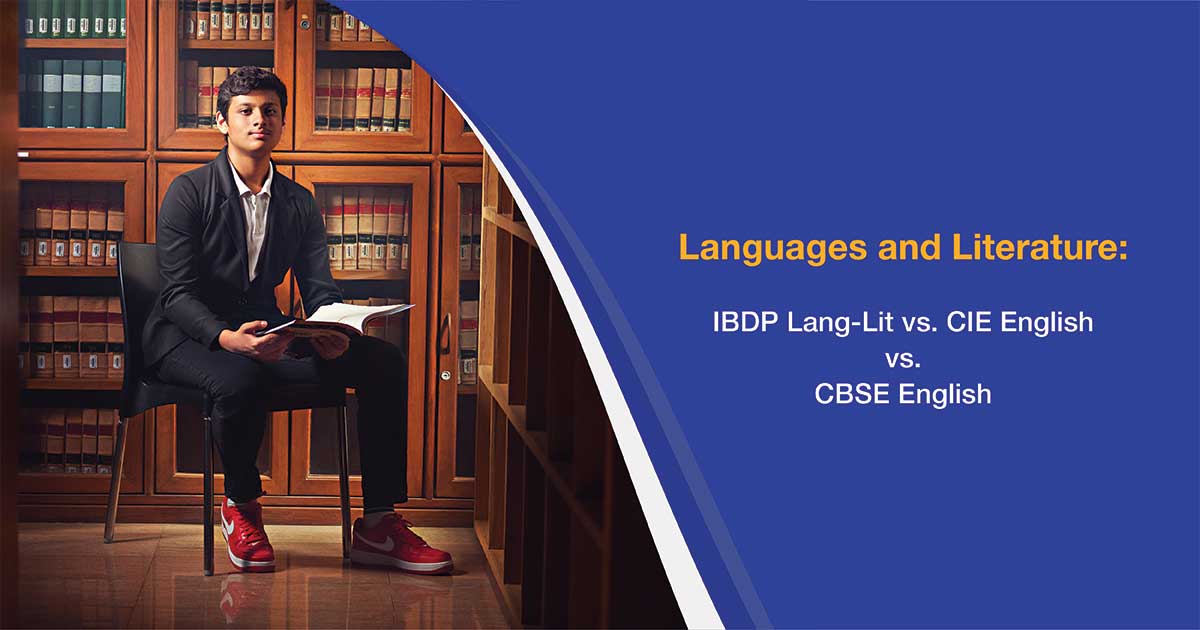

The IBDP course Language A: literature is a core course focusing on the comprehensive study of cultures, literary forms, and periods. The course builds the learner’s oral and written communication and develops their research, interpretation, analysis, evaluation, and presentation skills. In CIE’s English as a first language learners will learn to read, write, and listen to the language. Through the course, they will appreciate good literature and identify styles, learn standard writing practices, develop skills for evaluation, analysis, inference, and understand spoken language. CBSE programme has English as a core and elective subject, which concentrates on building their written and verbal communication skills. Let us look at the three courses.
Syllabus and Curriculum: IBDP Lang-Lit
IBDP Language A: literature can be opted in Standard Level or Higher-Level options. Students will learn analysis of literary works, techniques in literary criticism, and the role of cultural assumptions in interpretation. They will be assessed through a combination of written examination and oral and written coursework.
The curriculum design is –
| Standard Level | Higher Level |
| Minimum 150 class hours | Minimum 240 class hours |
| Study 13 literary works | Study 9 literary works |
| Present a 1200–1500-word essay |
Syllabus and Curriculum: CIE English
CIE’s English as a First Language curriculum seeks to engage learners with a wide range of genres and literary styles from the 20th and 21st centuries in fiction and non-fiction texts, and other forms of writing, such as discursive essays, reviews, and articles. Learners will study the effects and influences. They will learn to compose essays, letters, reports, articles, journals, speeches, interviews, and summaries. The course stresses presentation skills through organising content and applying language devices, such as irony, tone and emphasis.
Syllabus and Curriculum: CBSE English
CBSE English curriculum covers Reading and comprehension, creative writing skills, and Literature. Learners will study prose, poetry, and applied grammar and write an 80-mark written exam. Their listening, reading and comprehension skills will be assessed with a 20-mark seminar. The creative writing skills will be assessed through short writing tasks such as question and answers or advertisement copy. There will also be a long writing task such as a speech or essay on contemporary issues.
Assessment: IBDP Lang-Lit
IBDP Language A: literature assessment includes one paper on Guided Literary Analysis and one Comparative Essay which is externally assessed. There will be an individual oral exam which will be assessed internally. HL learners have to present an essay, which will be an academic research paper on a topic of their choice that will delve into the course and demonstrate their learning.
Assessment: CIE English
CIE English as a First Language learners will be assessed through two papers for Reading and Directed Writing and Composition. The written tests will include Questions and Answers, comprehension and summary writing, extended responses to reading, discursive/argumentative/persuasive speech writing, and descriptive or narrative composition. There is one Component for creating a portfolio of the three assignments done through the duration of the programme and a final component that includes a speaking and listening test. There will be internal and external moderation.
Assessment: CBSE English
CBSE’s English assessment includes a 20-mark internal assessment which will have a Listening and speaking skill assessment and a 10-mark project work. The written exam will be assessed and conducted by the Board and will cover Reading and comprehension of unsees passages, creative writing with question and answers, letter writing, article/report writing, and invitation and reply writing. There is a third component in the written exam with Multiple Choice Questions, Objective Type Questions, Short Answer Type Questions and Long Answer Type Questions to assess comprehension, interpretation, analysis, evaluation, and extrapolation beyond the text.
Scope after 12th: IBDP Lang-Lit vs. CIE English vs. CBSE English
All three courses are compulsory subjects, and their primary aim is to hone the communication and soft skills of the learners. Students will be introduced to popular works of literature, and different oral and written communication styles and improve their presentation skills. These are essential for writing coursework and thesis, and preparing presentations in college. Furthermore, learners will be prepared for composing and articulately presenting long-form and short-form responses. These are basic skills every professional must know, irrespective of which field they choose to pursue their career in. From the basics of composing formal letters to preparing informal invitations, learners will learn the importance of grammar and syntax, and expand their vocabulary through reading literary texts. These will be beneficial in preparing for entrance exams such as SAT, CET, CAT, TOEFL or other important tests.
Final Thoughts
Command of the English language helps in succeeding anywhere in the world because it is one of the most widely spoken languages internationally. Furthermore, a lot of the tools that we use to work and communicate have English as the mode or language of instruction. IBDP, CIE, and CBSE all offer a challenging curriculum which will help the student build a strong command of the language.
Recent Blogs
Site Designed and Maintained By : Office of Communications, JAIN Group All rights reserved.